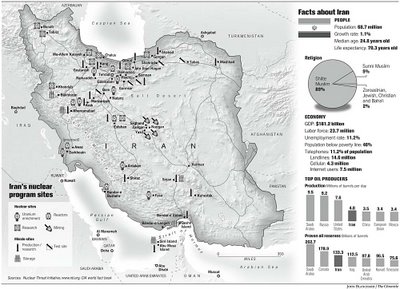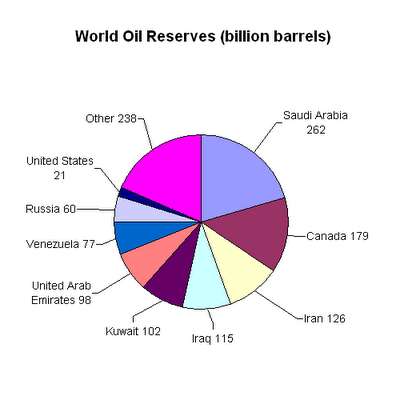The Challenge of Iran and the Defeat of Terrorism – Part II
“After all, who truly believes, after the attacks of Sept. 11, 2001, that the status quo in the Middle East was stable, beneficial and worth defending? How could it have been prudent to preserve the state of affairs in a region that was incubating and exporting terrorism; where the proliferation of deadly weapons was getting worse, not better; where authoritarian regimes were projecting their failures onto innocent nations and peoples; where Lebanon suffered under the boot heel of Syrian occupation; where a corrupt Palestinian Authority cared more for its own preservation than for its people's aspirations; and where a tyrant such as Saddam Hussein was free to slaughter his citizens, destabilize his neighbors and undermine the hope of peace between Israelis and Palestinians? It is sheer fantasy to assume that the Middle East was just peachy before America disrupted its alleged stability.”
Condoleezza Rice
Whatever else you might think about the war in Iraq, the fact is that the Iraqis have stopped supporting Islamic terrorism outside their borders and no longer pose a threat of using or supplying WMD to these monsters. Al Qaeda violence in Iraq has been quelled, and the problem there has shifted to the traditional enmity between Shi’as and Sunnis that has led to extreme violence in the presence of a weak government and our reluctance to use overwhelming force. The scene has now shifted to Iran, where major Islamic terrorism against America started in 1979, and where, fortunately, we just happen to have armies next door on both sides.
In my previous post on Iran, I described that country as the key now to ending the extreme violence in the Middle East and, if Iran withdraws from supporting terrorism, the problem for the rest of the world should become more manageable, and both Hamas and Hezbollah would lose their main sponsor. Unfortunately we are confronting an Iran that has a large and heterogeneous population, huge resources, and a leadership that is constantly threatening to use the nuclear weapons they are developing against the US and our allies (especially Israel). To confound policymakers even further, there are many signs and signals that large segments of the Iranian population want to cast off the rule of the fundamentalists, end the nuclear weapons program and pursue a peaceful and democratic advance into the 21st century.
Given the number and disbursement of heavily protected sites known to exist, there seem to be only two ways to end the Iranian nuclear weapons development program so long as the fundamentalists remain in power – a gigantic and extensive bombing campaign that would take many months and jeopardize many pilots' lives; or a nuclear strike followed by a costly invasion. The moral question aside (we would kill large numbers of innocent Iranians, many of whom are pro-America), neither alternative is attractive or likely, given the present stretching of our own military, the divisions in our country, the rallying cry this would certainly supply to Muslim terrorist groups, and the opprobrium America would undoubtedly receive from the rest of the world.
I believe that the only course of action that makes any sense is a strategy that takes two directions: 1. reverse course in our dealing with Iran, end the sanctions, and try to develop as many contacts as possible – government to government and person to person, while also improving our intelligence capabilities. Find ways to encourage and support groups there to achieve a true democracy, 2. at the same time, expand our military, forget about leaving Iraq any time soon, build permanent bases there and in Afghanistan and a capability to respond massively and immediately at the first sign that the Iranians are planning a nuclear strike. I believe that the Sunni-majority nations in the area, which seem to fear a strong, heavily-armed Iran as much as we do, would be silently supportive of such a strategy.
With a divided nation behind him and with so many Americans unwilling or unable to face the eerie Islamic conquest of Europe now taking place, with memories of 9/11 fading under the slime of incredibly nasty partisan politics, President Bush has been unable or unwilling to call for the sacrifices necessary to preserve our way of life. In the past, shielded by oceans and distance, America has always had time to wake up out of our slumber and rearm. We no longer have that luxury. We need a draft. We need to forget about leaving Iraq for many years. We need a many-fold expansion of our military to confront the threat we face from Islamic terrorism world-wide and from nuclear armed madmen in Iran. There are signs that President Bush recognizes that step 1 is necessary. It may take another 9/11 to convince the American public that step 2 is overdue.
The alternative may be denial to us of access to 55% of the world’s oil and living our lives under the Sharia. In a province of Canada, Muslims came close to imposing Sharia law, they are succeeding in parts of mainland Europe, and getting close to succeeding in Great Britain.
“What would President Bush say to the Iranian people if he had a chance to communicate directly with them? I was able to put that question to Bush in a one-on-one interview in the Oval Office on Wednesday. His answer made clear that the administration wants a diplomatic solution to the confrontation over Iran's nuclear program -- one that is premised on an American recognition of Iran's role as an important nation in the Middle East.
"I would say to the Iranian people: We respect your history. We respect your culture. We admire the entrepreneurial skills of your people. I would say to the Iranian people that I recognize the importance of your sovereignty -- that you're a proud nation, and you want to have a positive future for your citizens," Bush said, answering quickly and without notes.” David Ignatius
*********************
This Just In As We Publish:
US secretly woos Khatami
Toby Harnden in Washington
UK Telegraph
The Bush administration made secret overtures to former Iran president Mohammed Khatami during his visit to the United States last month in an attempt to establish a back channel via the ex-leader.
American officials made the approach as part of a strategy to isolate Mahmoud Ahmadinejad, Mr Khatami's hard-line successor, by using the former president as a conduit to the Iranian people.
Mohammed Khatami at the UN
They also hoped that Mr Khatami would report his conversations to senior members of Iran's theocratic regime who are wary of the current president. Diplomatic sources said that "third parties" were authorised by Nicholas Burns, the US under-secretary of state responsible for relations with Iran, to talk to Mr Khatami in a step towards "engagement" with senior Iranians.



0 Comments:
Post a Comment
<< Home